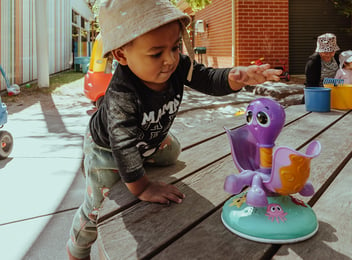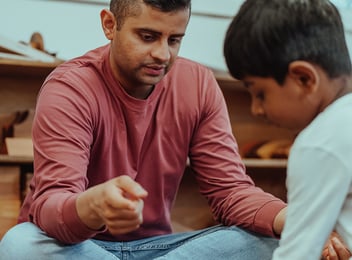Version 2 of the Early Years Learning Framework asks us to consider sustainability in all its forms. We ask Rebecca Hand, our Director of Early Childhood Education, how this commitment aligns with Communities of Practice.
What is a Community of Practice?
A Community of Practice (CoP) is an established way of working in the Early Childhood sector. We’re doing it every day and meeting the needs of children by collaborating professionally as a team. It’s a partnership model where everyone is equal in their place of teaching and learning, and it is a mechanism for transferring knowledge across different disciplines.
The use of the word ‘community’ is really important because we know that communities are built through shared interests, backgrounds, knowledge, experiences and understandings.
How do we ‘play our part’ sustainably?
The way we contribute, navigate, share our background and knowledge in our learning spaces and how we make room for others to do the same, is about playing our part in building socially sustainable ways of being ‘with’ each other.
Who makes up a Community of Practice?
Members of a Community of Practice are practitioners interested in outcomes. Together, we develop a shared set of resources: experiences, stories, tools and ways of addressing recurring problems. In short, it’s a shared practice.
When we come together as a Community of Practice, our shared interests are our children and families and trying to do the best we can for them to grow and flourish. Within our group there is a shared sense of responsibility to reach a mutual goal.
Why is it important?
We know it makes a real difference to children and their families. We also use CoP for trans disciplinary skill sharing with our partners, for example Alannah & Madeline Foundation’s Circle of Security training. We can support children better and respond properly if we work through CoP with partners with other skills.
What is our approach?
ECMS has a bespoke way of ‘doing’ and our Practice Coaching framework supports our leaders. All CoP are designed through ECMS’ pedagogical framework, so it’s a way to build our collective professional identity through a key knowledge base.
We also have a strong focus on meeting people ‘where they’re at’. We care about people’s diversity and we’re proud of how this is reflected in our workforce. The cultural diversity of our people mirrors our communities. So, when we come together in a space with people of many cultures it creates a way to ‘be together’ in a way that everyone is included.
Why is our approach working?
Because we’re really good at meeting people where they’re at, we’ve landed a CoP model that’s working for our collective professional identity.
We believe in leading from the middle, not telling people what to do from the top of the organisation, down.
Why is our approach different?
Our CoP is responsive, and we ask education leaders “what do you need?” to be strong leaders in teaching and learning.
Through surveys and conversations, we design opportunities based on the goals set together during School Readiness Funding (SRF) applications at the beginning of each year. Across this process we document educators’ professional training goals and collaboratively figure out what the best training and learning is for them to meet the needs of children at practice.
Why is CoP important for educators?
What makes the biggest difference is how we lead in our community, therefore the stronger our leaders, the stronger our pedagogical framework. CoP also promotes self-sufficiency - ultimately, we’re responsible for ourselves as educators and sharing our knowledge with others and living respectfully together in local, global and even professional communities.
Read On

Wellbeing and environmental study with Deakin University
ECMS has partnered with Deakin University to undertake a study into how young children’s...
Partnering with families to optimise children’s development
Recognising parents and families as children’s first and most important teachers, ECMS centres...
